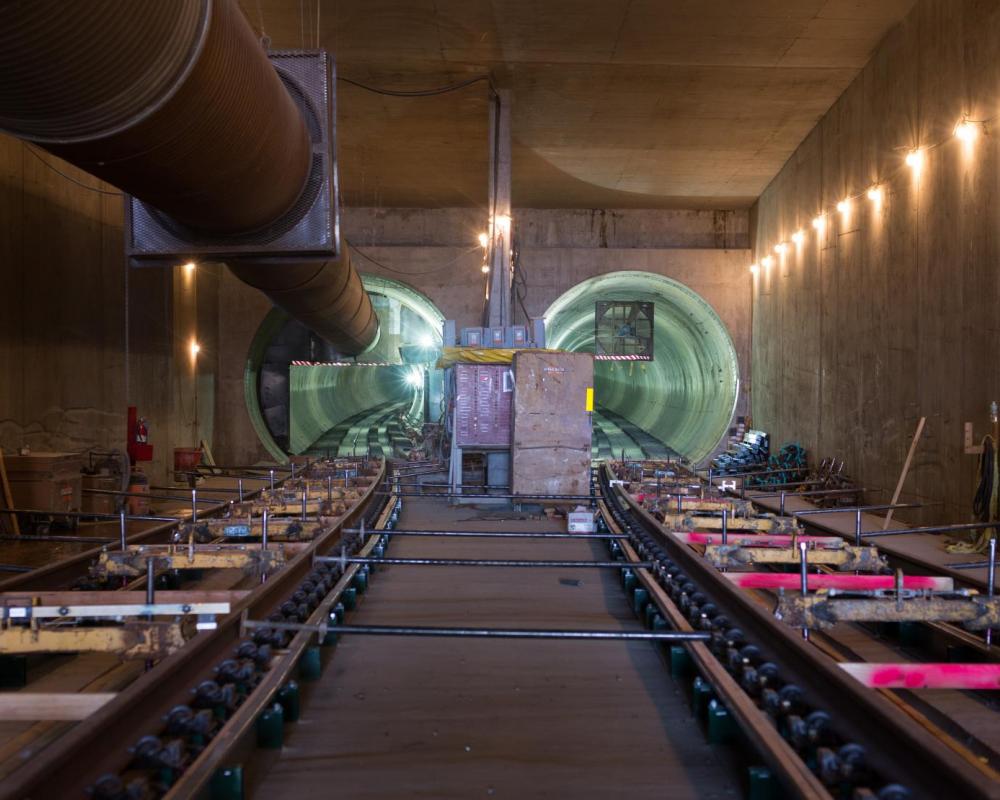 One of the PUC's suggested treatments would daylight Yosemite Creek along city streets.
One of the PUC's suggested treatments would daylight Yosemite Creek along city streets.Want to see an unprecedented outpouring of public support for a government agency? Look no further than your nearest sewer.
A Monday afternoon presentation before the Board of Supervisors Land Use & Economic Development Committee by the San Francisco Public Utilities Commission (PUC) was met with great interest and support by numerous public speakers. The primary topic was the PUC's Urban Watershed Management Program, an ambitious blueprint for cleaning local water, restoring wildlife, and putting an end to beach-closing sewage spills.
Tommy Moala, the Assistant General Manager of the SFPUC's Wastewater
Enterprise, explained that the PUC's emphasis has shifted away from
building more concrete structures and toward low-impact designs like
green roofs, daylighted creeks, rain barrels, and permeable
pavement. This represents a massive change in the way cities think
about water: For decades, it's been about reducing natural areas and
channeling water into treatment plants. Now, for the first time, San
Francisco is among a handful of cities experimenting with more
ecological alternatives.
These new practices are often met with skepticism. "A few years ago,"
Moala said, "the most difficult presentation was to our own staff."
Engineers often appreciate the measure of predictability gained by
getting rid of green space and putting water underground. But gradually,
PUC staff has come around.
The PUC's Rosey Jencks explained that the city's sewers are old,
and face increasing risk of failure. We have a choice: to rebuild the
same way, or to adapt our streets to function more like parks.
The benefits of low-impact design are clear. Under existing
conditions, combined sewer discharges along public beaches release
nearly 200 million gallons a year, while low-impact design (LID) improvements would reduce
that amount by 91 percent. Discharges on Mission Creek would be reduced 37 percent,
and on Islais Creek by 28 percent.
These improvements are still a long way off. Currently, the PUC is
in an idea-generating phase, to be followed by cost-benefit analyses. In
the next twelve months, neighborhood outreach meetings will be held as
part of a community design phase.
A check-in with the PUC's Urban Watershed Management Program was on the committee's agenda thanks to Supervisor David Campos, whose district encompasses several important creeks. And the issue of urban watersheds was on Supervisor Campos' mind thanks to a dedicated army of activists.
Indeed, Monday's meeting was an extraordinary who's who of local water conservationists, and the board heard testimony from Bonnie Sherk of A Living Library, Jennifer Clary of Clean Water Action, Noreen Weedon of Golden Gate Audubon Society, Greg Gaar and Peter Brastow of Nature in the City, Alma Hecht of Second Nature Design, Carole Schemmerling of the Urban Creeks Council, Peter Berg of the Planet Drum Foundation, PUC citizen advisers Judy West, Lurilla Harris, and Lisa Warne, Eric Brooks of the SF Green Party, Fran Taylor of CC Puede, and Tom Radulovich of Livable City.
These are people who know a thing or two about watersheds -- without them, San Francisco might just be one big expanse of asphalt -- and every single one of them was a supporter of the PUC's progress towards sustainable low-impact designs.
As a result, neighborhood outreach may turn out to be entirely amicable and upbeat, judging by the public comment at Monday's meeting. Every single speaker supported the PUC's movement away from old-fashioned stormwater management, although a few people expressed misgivings on a few specific points and others urged the commission to go even further. "This is a great opportunity," said Fran Taylor, an advocate for Cesar Chavez upgrades.
Bonnie Sherk, a longtime advocate for ecological restoration, issued a reminder that the city's watersheds are large, and extend far beyond just the banks of a few creeks. Islais Creek, for example, touches about a dozen neighborhoods from Noe Valley to Bayview.
Lurilla Harris, a member of the PUC's Citizens Advisory Committee, also raised a flag regarding the PUC's plan to renovate the Alemany Farmer's Market with green roofs and a daylighted Islais Creek. The area was once owned by the military, she pointed out, as well as by leather and paint factories that may have left behind polluted soil. "We've got to be very careful about what we're releasing into that habitat," she said.
Supervisors Eric Mar and Sophie Maxwell also raised concerns about maintenance, specifically garbage collecting in daylighted creeks.
The PUC's Jencks admitted that these facilities will require regular attention, but so do old-fashioned sewers. "We'll just be doing maintenance a different way," she said.
The PUC has already undertaken experimental small-scale LID projects around San Francisco: Mint Plaza features rain gardens and permeable paving, while bioswales and infiltration basins have been installed at Sunset Circle near Lake Merced. Other local demonstration projects include rainwater collection systems at local schools and a green roof at the Summit Pump Station, as well as projects still in the planning or construction phase such as Sustainable Civic Center, Teresita Rain Garden, and the Ortega Library Vegetated Roof.
Karen Kubick, the Manager of the PUC's Wastewater Capital Improvement Program, was confident that the PUC is pioneering a lasting change in the way that urban watersheds are protected.
"This," she told the committee, "is how it will be done in the future."





